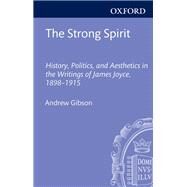The Strong Spirit History, Politics and Aesthetics in the Writings of James Joyce 1898-1915
, by Gibson, Andrew- ISBN: 9780199642502 | 0199642508
- Cover: Hardcover
- Copyright: 5/5/2013
Scholarly accounts of Joyce's early work have traditionally resorted to two historical keys to try to unlock it: a concept of the Dublin and Ireland in which he grew to adulthood as stagnant and backward, and an emphasis on 1904, the year of the supposedly crucial break in which Joyce quit Ireland for continental Europe and could begin his great modernist literary project. But modernist or no, Joyce's works are always about Ireland, and he remained vitally in touch with Irish historical developments throughout his life. This study aims to be the first comprehensive historicisation of Joyce's writings 1898-1915 in relation to the distinct phases and shifting currents of British-Irish history during the period. At the turn of the century, when a concept of `national resurgence' is much in the Irish air, in his earliest essays, Joyce meditates on art as an anti-colonial and emancipatory project that addresses questions of freedom and justice in its own distinctive way. His early essays produce a compelling declaration of a principle of autonomy at a specific historical moment in a colonial culture. However, successive historical events - the crises surrounding the Land Act, the United Irish League and Devolution, the election of 1906, the Third Home Rule Bill crisis - call the emancipatory project ever more sharply into question. Thus `the strong spirit' which Joyce had initially thought might transcend and even conquer the effects of history becomes indissolubly wedded to radical historical scepticism. Through Dubliners, Stephen Hero, the `Triestine Writings' and A Portrait of the Artist as a Young Man to Exiles, Joyce responds to his predicament by examining recent Irish history and the place of the intellectual and artist within it in a variety of extremely subtle and complex or, in Joycean terms, `labyrinthine' forms of writing.







